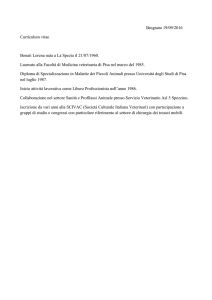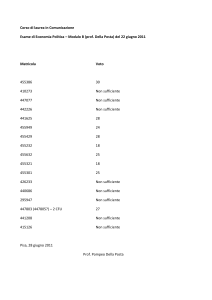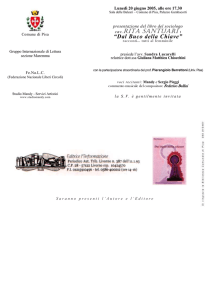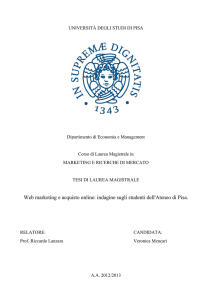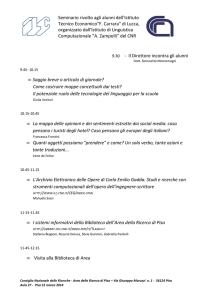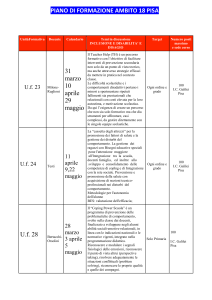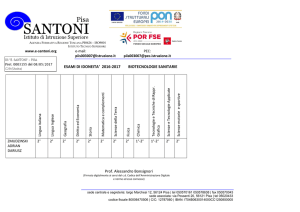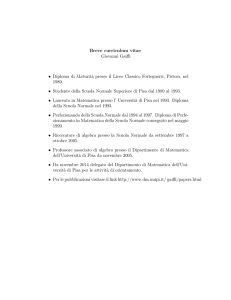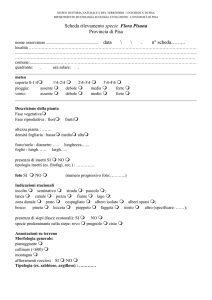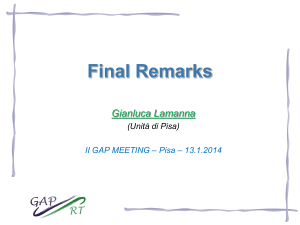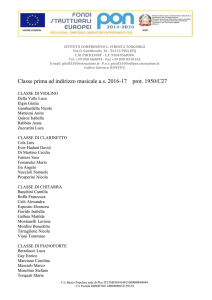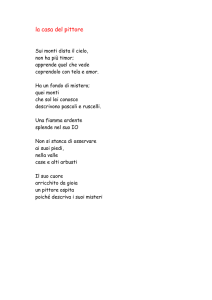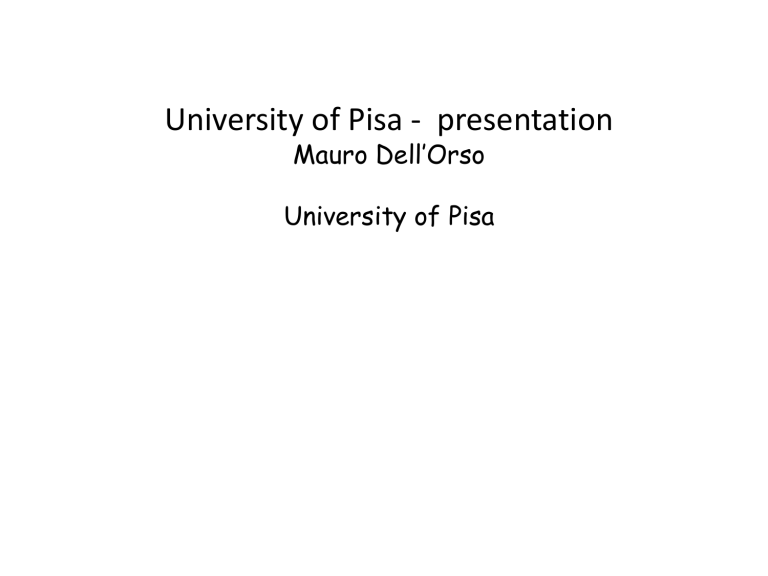
University of Pisa - presentation
Mauro Dell’Orso
University of Pisa
Galileo Galilei (Pisa, 15 febbraio 1564 –Arcetri, 8 gennaio 1642)
PHYSICS @ Pisa
Since GALILEO….
Durante la sua permanenza a Pisa, protrattasi
fino al 1585, Galileo arrivò alla sua prima,
personale scoperta, l'isocronismo delle
oscillazioni del pendolo.
The 19 agosto 1780 Alessandro Volta traveled in Toscana, "dove
potrà entrare in discorso con que' Letterati ed osservare
esattamente i Gabinetti di Fisica Sperimentale, la struttura e il
pratico maneggio de' rispettivi Istromenti « to report on the
sperimental activity there
Enrico Fermi at the Scuola Normale Superiore di Pisa
Fra il 1919 ed il 1923 studiò la relatività generale, la meccanica quantistica e la fisica
atomica. La sua preparazione in meccanica quantistica raggiunse livelli talmente elevati che
Luigi Puccianti, direttore dell'Istituto di Fisica presso la Scuola Normale, gli chiese di
organizzare alcuni seminari sul tema. Sempre in questo periodo apprese il calcolo
tensoriale, strumento matematico inventato da Gregorio Ricci-Curbastro e Tullio Levi-Civita,
indispensabile al fine di dimostrare i principi della relatività generale.
The Enrico Fermi department of Physics in Pisa is classified to be in the first 100 in the world.
It has ~ 90 faculty members.
The University and Scuola Normale Superiore (SNS) find a common structure in the INFN for
HEP experiments.
HEP activity is strongly supported by
(a) a strong theoretical team;
(b) large laboratory space for all different activities
(c) high-level infrastructures for electronics service
(designing and production/test of boards)
(d) mechanics service (designing, developing, integrating
detectors and large structures),
(e) high-technology (clean-rooms for silicon detectors with
all necessary machines),
(f) computing (GRID facilities).
Pisa had a leading participation to into Collider experiments:
Aleph (LEP) - Lorenzo Foa’
for collider physics:
CDF (Fermilab): G. Bellettini, F. Bedeschi, L. Ristori, G. Punzi
CMS (Geneve): G. Tonelli
The Tracker Inner Barrel (TIB) was designed/produced in Italy and integrated in the large Pisa
infrastructures.
The Atlas group is small but had an important role in the tile calorimeter construction and has
now a leading role in the FTK project (P. Giannetti Deputy Leader).
The Heavy Flavour experiments have been strongly represented both in the
K (Epsi) and B (Babar) sectors;
the neutrino sector by the Chooz and Nomad collaborations: Prof. Bemporad
the rare decay experiments by the MEG and the N64 experiments: Prof. Mannelli
the gravitational wave physics by the VIRGO laboratory: Prof Giazzotto, Fidecaro.
A large activity is present for astroparticle physics :
Glast, AMS, Cream, Magic, Antares and Nemo.
THE UNIPI GROUP
Physicists with large experience in
Hadron Collider Physics (CDF, Atlas)
in particular trigger and online/offline tracking
(SVT at CDF and FTK at Atlas, data analysis).
Prof. M. Dell’Orso
Proponent of the Associative Memory
for HEP - NIM A 278, 436 (1989)
Researcher C. Roda, coordinator of the ATLAS Pisa group
INFN Director of Research P. Giannetti: Proponent of the FTK processor for LHC experiments
Researcher S. Donati: Trigger responsible of CDF experiment
Strong technical support in the electronic field:
Engineer M. Piendibene: large experience in CDF trigger & AM system development and test.
Responsible of the AM boards in FTK
INFN Technology Researcher R. Beccherle
Engineer S. Citraro
Some publications relevant for the Group activity
“Observation of B0s - anti-B0s Oscillations”. CDF Collaboration, Phys. Rev. Lett. 97, 242003, 2006;
A. Annovi et al., “A VLSI Processor for Fast Track Finding Based on Content Addressable
Memories”. IEEE Transaction on Nuclear Science, vol. 53; p. 2428, 2006
A.Bhatti et al. “The CDF level 2 calorimetric trigger upgrade”. IEEE Transaction on Nuclear
Science, Volume 56, Issue 3, pp 1685-1689, 2009

